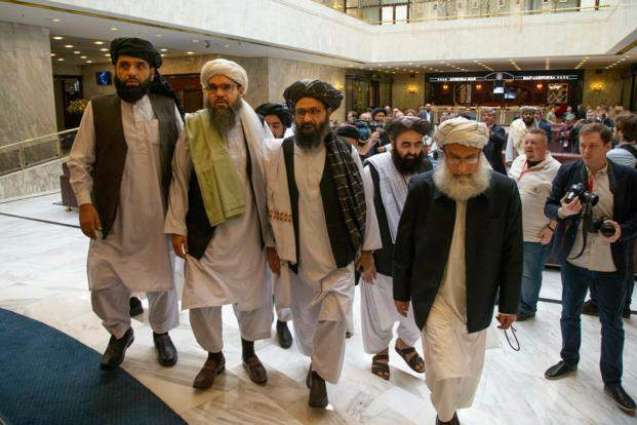As Afghans await the results of the ninth round of the US-Taliban talks, there is an understanding that a potential peace deal would elevate the radical Islamist movement to the government's level on the Afghan political landscape and thus bring about far-reaching consequences
KABUL (Pakistan Point News / Sputnik - 26th August, 2019) As Afghans await the results of the ninth round of the US-Taliban talks, there is an understanding that a potential peace deal would elevate the radical Islamist movement to the government's level on the Afghan political landscape and thus bring about far-reaching consequences.On Thursday, the US delegation and Taliban sat down for a new round of talks in the Qatari capital to negotiate a deal that would include the withdrawal of foreign troops from Afghanistan in exchange for the movement's guarantee that the country would not be used as a safe haven for terrorists. The dialogue excludes the Afghan government, whom the Taliban brands as a US puppet.
On Friday, the Taliban announced that they had reached a tentative agreement with the United States on a time frame for foreign troop withdrawal from Afghanistan, declining to reveal details until the sides agree on the implementation mechanism itself. The rumors are that the time frame in question is 15 or 20 months.
Media also reported that the two sides had reached an agreement on an interim government that would include members of the Taliban, but US Special Representative for Afghanistan Reconciliation Zalmay Khalilzad refuted the reports, saying that "governance decisions are for Afghans to make in intra-Afghan negotiation."
CEASEFIRE IN EXCHANGE FOR scheduled TROOP PULLOUT?
Much of the talk is believed to be centering around the post-deal US intelligence presence in the region, since US President Donald Trump, despite continuing troop drawdown, has repeatedly stressed his determination to leave "very strong intelligence" in the country, which he describes as a "lab for terrorists."
"There is still talk of how the US intelligence presence will be in Afghanistan, how the US will implement its troop withdrawal after agreeing with the Taliban," a source close to the Taliban told Sputnik.
The sides also continue discussing prisoner exchange issues, the source added, mentioning the case of Aafia Siddiqui, a Pakistani woman dubbed in media as Lady al-Qaeda (a terrorist group, banned in Russia). Media outlets have earlier alleged that the release of Siddiqui, who is serving her 86-year sentence in Texas for several counts of attempted murder and assault of US personnel, has been among the Taliban's top requirements in prisoner swap talks.
According to the source, the sides also touch upon the issue of a "balance of power" in the future intra-Afghan talks, so that the Taliban could join them not like certain group but as an equal to the Afghan government.
Akbar Agha, a former Taliban official, meanwhile, said that the United States insisted on ceasefire in return for an agreed time frame for troop pullout.
"Americans want a ceasefire in exchange for a troop withdrawal schedule, but the Taliban say this is [a matter for] intra-Afghan talks. The agreement is close to being signed and will be completed by the end of this week," Agha told Sputnik.
Afghan journalist Abid Ehsas, who follows the ongoing peace talks, shared the belief that the deal was likely to come soon.
"The agreement is most likely to be done in a few days, but if the mediators in this agreement are not from Afghanistan, perhaps the interests of America are more favorable than Afghanistan," he told Sputnik.
Ehsas also suggested that when the United States and the Taliban ultimately reached a deal, the Taliban would automatically get a status that is politically equal to the US-backed Afghan government.
Meanwhile, the Afghan presidential election is nearing. While the Taliban and Khalilzad deny that the September 28 vote is on agenda of their talks, some candidates believe that the election should be delayed to prioritize peace process instead.
The ongoing peace talks with the Taliban do not meet unanimous support among the US establishment either.
Republican Sen. Lindsey Graham, one of Trump's allies, in particular, is concerned that pulling troops out of Afghanistan and "outsourcing" security to the Taliban might "expose the American homeland to another 9/11."
"You may get a peace deal with the Taliban, but you'll never get a peace deal with al-Qaeda or- and ISIS [both terrorist organizations, outlawed in Russia]. They have an intent to strike America. They just don't have the capability yet. If we leave and outsource our national security to the Taliban that they're gonna take care of al-Qaeda and ISIS, that would be a disastrous decision," Graham said in a Sunday interview with the CBS's Face the Nation news program.
In general, he expressed doubt that the deal would be struck and argued that the Taliban "don't have the capability or will to protect the American homeland."




